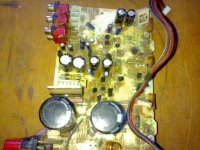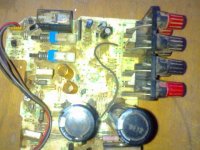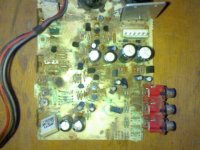Hi guys,
I have this 'ancient' amp pcb i want to repair but its really dirty. What do you use to clean pcb?Methylated spirit?Alcohol?Gasoline?...that solvent used in dry cleaning?(i forget the name).
Regards Xeclipse
I have this 'ancient' amp pcb i want to repair but its really dirty. What do you use to clean pcb?Methylated spirit?Alcohol?Gasoline?...that solvent used in dry cleaning?(i forget the name).
Regards Xeclipse
Yes, if you use alcohol, make sure it's 99%....I bought something lesser the first time and the results were not good!
Dishwasher then a dehydrator. Worked great on the 1978 Ampex video recorder. Boards look like new. I think your solvent might be 1.1.1 TCE.
G²
G²
Detergent for dust, no doubt it is self cleaning. M3 for plastic or ink removal.
GREAT!! you found ANCIENT PCB. It must be BIG ROCK scratched with copper or orichalc, finger scale drill hole for house scale devices. Also with magic and super enhancements from ancient era.
GREAT!! you found ANCIENT PCB. It must be BIG ROCK scratched with copper or orichalc, finger scale drill hole for house scale devices. Also with magic and super enhancements from ancient era.
Chuck it in the dishwasher and then leave it in the sun for the afternoon to dry again. I restore many, many old bits of kit and this method really works the best for whole assemblies. Of course, make 100% sure it's dry before powering up.
Now that thing really needs a thorough clean up, here's what I do...
Soak the board in detergent solution for 15-20mins, use a shallow basin/bucket etc. just enough for the whole board😉 While soaking use a paintbrush to clean hard to reach areas, slowly but surely wiping the dirt off. Rinse thoroughly, then let it dry under the sun or use a hot blower.😎
I also use kerosene for lighter cleaning you can even test the board while it is still wet, kerosene do not have electrical continuity and will not damage the equipment. It works for me😉
Regards
Soak the board in detergent solution for 15-20mins, use a shallow basin/bucket etc. just enough for the whole board😉 While soaking use a paintbrush to clean hard to reach areas, slowly but surely wiping the dirt off. Rinse thoroughly, then let it dry under the sun or use a hot blower.😎
I also use kerosene for lighter cleaning you can even test the board while it is still wet, kerosene do not have electrical continuity and will not damage the equipment. It works for me😉
Regards
Not like what I think, of ancient😀.
It is modern PCB. Water is not harmful for switches and relays they are easy to dry, but some cheap iron-copper cables may have faster corrosion. Using dishwasher or detergent is OK. Wash with water after using detergent to clean its remains.
If you choose 70% 2-propanol(isopropilalcohol) 30% is water, and 90% is expensive and dangerous, please read PIM290 for this chemical, before using because it is poisons. Avoid to breathe in it, skin contact, and much more. It may harm your health or even causing in death.
Here is the link:
http://www.inchem.org/documents/pim...tle:4.2 High risk circumstances of poisoning
It is modern PCB. Water is not harmful for switches and relays they are easy to dry, but some cheap iron-copper cables may have faster corrosion. Using dishwasher or detergent is OK. Wash with water after using detergent to clean its remains.
If you choose 70% 2-propanol(isopropilalcohol) 30% is water, and 90% is expensive and dangerous, please read PIM290 for this chemical, before using because it is poisons. Avoid to breathe in it, skin contact, and much more. It may harm your health or even causing in death.
Here is the link:
http://www.inchem.org/documents/pim...tle:4.2 High risk circumstances of poisoning
Last edited:
If you need superclean, use freon (CFC), but do not let them out from your room and destroying your atmosphere O3.
No - chlorinated hydrocarbons are a ticking time bomb for electrolytic capacitors - they get into the works via the rubber seal and cause the insides of the cap to disintegrate. Of all the various solvents, isopropyl alcohol is the least dangerous to people and components. I would imagine ethyl alcohol would also work, but most folks seem to have better uses for it than cleaning circuit boards. Acetone should be avoided, especially if you are using polystyrene capacitors (it dissolves them). Commercial flux remover (a mix of solvents) works pretty well, but is expensive. If you mark your boards with magic marker, it will remove it. This is useful to know if you need to remove magic marker, for example, from a white board where some fool used a permanant marker instead of the dry-erase kind.
Oops.. then do not use it, there are two big electrolyt on your board. I never think about its rubber seal before, thanks for wrenchone.
A trip in the dishwasher (use no detergent) will clean the board. If the switches are sealed, this should not cause issues. Follow up with a soak in de-ionized water and let it dry for a week in a warm place.
Isopropyl alcohol (aka rubbing alcohol) will work as well. Make sure to get the strong stuff.
~Tom
Isopropyl alcohol (aka rubbing alcohol) will work as well. Make sure to get the strong stuff.
~Tom
Thanks guys.
I think i'll settle for a little detergent.The only alcohol i can get now is 40% ethanol (from the liquor shop!)
Regards Xeclipse.
I think i'll settle for a little detergent.The only alcohol i can get now is 40% ethanol (from the liquor shop!)
Regards Xeclipse.
- Status
- Not open for further replies.
- Home
- Amplifiers
- Solid State
- what do you use to clean pcb



